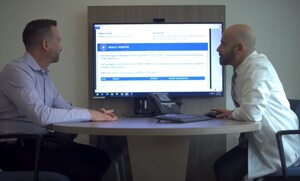Hackensack Meridian Health Develops RE-COV-RY (Real world Evidence - COVid-RegistrY) to Study the Effects of COVID-19 and Releases Key Findings on Hypertension and ACE/ARB Treatments
Hypertension, the most common co-existing condition, is not a significant risk factor for mortality when adjusted for age and other comorbid conditions - ACE and ARB anti-hypertensives are safe in this population and may be protective
EDISON, N.J., April 24, 2020 /PRNewswire/ -- Hackensack Meridian Health, New Jersey's largest and most comprehensive health network, conducted an observational real world study of more than 3,000 hospitalized COVID-19 patients and found that hypertension, the most common co-existing condition, does not have a major impact on survival from the infection when adjusted for age and other comorbid conditions. The study also found that commonly prescribed medications to treat high blood pressure may potentially have a positive impact.
These major findings are to be released today on medRxiv, a leading Yale University-affiliated online platform for researchers to share scientific information prior to publication in peer-reviewed journals. The study was based on a ground-breaking database – the RE-COV-RY (Real world Evidence-COVid-RegistrY) – one of the largest compilations of hospital-based COVID-19 data in the U.S. to date. This is the first study released from the network's database which will enhance the understanding of this disease and potentially contribute to effective therapies.
"I am so proud of our Hackensack Meridian Health clinical and research teams who are helping to tackle this unprecedented global challenge," said Robert C. Garrett, FACHE, chief executive officer of Hackensack Meridian Health. "This groundbreaking study will help our hospitals, as well as hospitals throughout the country, better understand the impact of potential therapies and important risk factors. The RE-COV-RY database will save lives and improve outcomes.''
Hypertension, or high blood pressure, is one of the most prevalent health conditions facing Americans. About one in three adults have high blood pressure which increases the risk of heart disease, stroke and kidney failure. The CDC has reported that nearly three in four hospitalized COVID-19 patients 65 and older had hypertension.
A major debate is underway on why hypertension makes patients vulnerable and what is the impact of commonly prescribed blood-pressure drugs. Experts agree that the drugs affect the same pathways that the virus uses to reach the heart and lungs. But a leading question in research is whether the anti-hypertensive drugs help or harm patients with this infection. The drugs are known as ACE-inhibitors and ARBs, and include commonly prescribed medications such as Vasotec, Prinivil, Altace, Cozaar, Diovan, and Benicar as well as their generic versions.
"Advanced age appears to be the most important risk factor among hospitalized COVID-19 patients. Our study shows that when you adjust age, hypertension is not a major risk factor in COVID-19 mortality,'' said Stuart Goldberg, M.D., a hematologist/oncologist and chief of the Division of Outcomes and Value Research at the John Theurer Cancer Center at Hackensack University Medical Center in New Jersey.
"We also looked at what hypertension medications patients were taking and determined there was no detrimental effect and potentially a positive effect with the use of ACE and ARB medications,'' Dr. Goldberg said.
The Heart Failure Society of America, the American Heart Association (AHA) and the American College of Cardiology (ACC) recently released a joint statement recommending continued use of commonly prescribed drugs for hypertensive patients with COVID-19.
The outcomes division of the John Theurer Cancer Center (JTCC) at Hackensack University Medical Center, under the leadership of Dr. Goldberg and Dr. Andrew Ip, created a database to guide the analysis of over 3,000 patients admitted to Hackensack Meridian Health facilities for urgent care.
"Being in an epicenter with a large volume of patients and having the benefit of a single electronic health record platform like Epic, Hackensack Meridian has been able to rapidly compile real-world data experience on over 3,000 patients to assess for risk factors, and the effect of therapeutic interventions being used to treat COVID-19 patients,'' Andrew L. Pecora, M.D., FACP, CPE, chief executive officer, Outcomes Matter Innovations, co-chief of the John Theurer Cancer Center Skin and Sarcoma Division.
Using a national leader in real-world evidence analysis to assist, COTA, Inc., the Hackensack Meridian JTCC team conducted univariate and multivariate analysis to identify risk factors for poor outcomes and to assess for potential effective therapeutic interventions. The data and statistical analysis were enhanced by Donald A. Berry, Ph.D, professor, Department of Biostatistics, The University of Texas MD Anderson Cancer Center and his team at Berry Consultants.
"We are in the midst of a global pandemic, and it is critical that we have the necessary data available for our medical professionals on the front lines of the COVID-19 crisis," said Ihor Sawczuk, M.D., FACS, regional president, Northern Market and chief research officer. "In the absence of randomized clinical trials, we must learn as much as we can in real-time as we battle this deadly virus. Our real-world database will be able to produce real, tangible results."
Researchers established an observational database through Epic – Hackensack Meridian's electronic health records (EHR) system – and collected a random sampling of COVID-19 patients who received treatment at one of 13 hospitals across the network. HMH investigators, COTA, and Berry Consultants also developed the Hackensack Meridian COVID-19 Risk Score (HMH-RS), a risk score model to account for disease severity. The HMH-RS includes patient gender, age, requirement of ICU care upon date of admission, serum ferritin, insulin dependent diabetes mellitus and history of cardiac arrhythmias as significant features. This model will be used in the future to measure the effectiveness of other potential COVID-19 treatments.
Hackensack Meridian has been at the epicenter of the evolving COVID-19 crisis in New Jersey. To date, the network has cared for over 3,000 patients with confirmed COVID-19 infections and is currently treating over 1,800 COVID-19 patients at its hospitals.
ABOUT HACKENSACK MERIDIAN HEALTH
Hackensack Meridian Health is a leading not-for-profit health care organization that is the largest, most comprehensive and truly integrated health care network in New Jersey, offering a complete range of medical services, innovative research and life-enhancing care.
Hackensack Meridian Health comprises 17 hospitals from Bergen to Ocean counties, which includes three academic medical centers – Hackensack University Medical Center in Hackensack, Jersey Shore University Medical Center in Neptune, JFK Medical Center in Edison; two children's hospitals - Joseph M. Sanzari Children's Hospital in Hackensack, K. Hovnanian Children's Hospital in Neptune; nine community hospitals – Bayshore Medical Center in Holmdel, Mountainside Medical Center in Montclair, Ocean Medical Center in Brick, Palisades Medical Center in North Bergen, Pascack Valley Medical Center in Westwood, Raritan Bay Medical Center in Old Bridge, Raritan Bay Medical Center in Perth Amboy, Riverview Medical Center in Red Bank, and Southern Ocean Medical Center in Manahawkin; a behavioral health hospital – Carrier Clinic in Belle Mead; and two rehabilitation hospitals - JFK Johnson Rehabilitation Institute in Edison and Shore Rehabilitation Institute in Brick.
Additionally, the network has more than 500 patient care locations throughout the state which include ambulatory care centers, surgery centers, home health services, long-term care and assisted living communities, ambulance services, lifesaving air medical transportation, fitness and wellness centers, rehabilitation centers, urgent care centers and physician practice locations. Hackensack Meridian Health has more than 35,000 team members, and 7,000 physicians and is a distinguished leader in health care philanthropy, committed to the health and well-being of the communities it serves.
John Theurer Cancer Center part of HMH, is one of only 16 NCI Designated Cancer Consortium in partnership with Georgetown Lombardi. In addition HMH has partnered with Memorial Sloan Kettering to accelerate discovery and make sure patients have access to the highest quality, most individualized cancer care when and where they need it.
The network's notable distinctions include having four hospitals among the top in New Jersey by U.S. News and World Report. Other honors include consistently achieving Magnet® recognition for nursing excellence from the American Nurses Credentialing Center and being named to Becker's Healthcare's "150 Top Places to Work in Healthcare/2019" list.
The Hackensack Meridian School of Medicine at Seton Hall University opened in 2018, the first private medical school in New Jersey in more than 50 years, welcomed its second class of 96 students in 2019 to its On3 campus in Nutley and Clifton.
Hackensack Meridian Health is a member of AllSpire Health Partners, an interstate consortium of leading health systems, to focus on the sharing of best practices in clinical care and achieving efficiencies. For additional information, please visit www.HackensackMeridianHealth.org.
SOURCE Hackensack Meridian Health

Related Links
WANT YOUR COMPANY'S NEWS FEATURED ON PRNEWSWIRE.COM?
Newsrooms &
Influencers
Digital Media
Outlets
Journalists
Opted In






Share this article